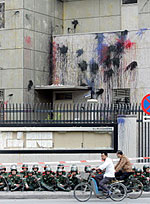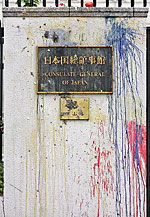




HONG KONG—China's official media are playing down a diplomatic rift with Japan, largely ignoring protests by tens of thousands of demonstrators in several major Chinese cities at the weekend, as top officials call for calm.
"The reports have all been very brief," Beijing-based dissident Zhou Guoqiang told RFA's Mandarin service after reviewing local newspaper coverage.
"In today's [Tuesday's] newspaper, the apology [for the war] by Japan's foreign minister was the main news angle in all the papers."
Japan's Foreign Minister Machimura Nobutaka expressed "deep regret and apology" for Japanese wartime actions in China, during a meeting Sunday with his Chinese counterpart, Li Zhaoxing.
But Nobutaka arrived in Beijing to demand an apology for the damage to Japanese property.
There's one group of people here who really hate the Japanese because of their invasion of China, and another group who say the Communist Party is worse even than they were.
"I had to get the rest of the Japanese foreign minister's remarks off the Internet," Zhou told RFA. "In fact he lodged a protest to China, but the Chinese media didn't report that."
"Basically nowadays if you don't go on the Internet, and you rely on television news, you really won't know what's going on. You would really believe the foreign minister came to apologize."
"The frightening thing is, this group of people are in the majority," Zhou said.

Li called for calm in a speech to 3,500 senior political and military officials, which was carried by state television Tuesday.
Speaking at a rare special meeting held by the party's Central Propaganda Department at the Great Hall of the People, Foreign Minister Li Zhaoxing urged senior party, military and government officials to increase the "sense of law" and be "calm and reasonable," China Central Television (CCTV) reported.
I don't think we should boycott Japanese goods, because we learn a lot from their technology. It is in the interest of both sides that trade relations remain normal.
"These past few years, Japan's negative policies toward China are showing more and more, causing complicated circumstances in Sino-Japanese relations," Li was quoted as saying by the television station.
"Currently our country is in an important period of building a moderately well-off society in all aspects," the TV network quoted Li as saying. "We will fully realize and appropriately handle the importance of Sino-Japanese relations."
In line with the apparent directive from top leaders to end the wave of anti-Japan protests, Chinese foreign ministry officials appeared to send out a more conciliatory message Tuesday in a regular briefing attended by foreign correspondents.
"The two sides should run in the same direction, rather than opposite ways," foreign ministry spokesman Qin Gang told reporters.
You can understand the reason for these feelings. But we should use more civilized means of dealing with the issue.
His comments were carried in a report by the official Xinhua news agency, which quoted him as saying that Tokyo would draw profound lessons from history and would continue to adopt a path of peaceful development.
Qin said that China and Japan both benefited from mutual economic and trade cooperation, and that Nobutaka had reiterated support for the "One China" policy, and not for formal independence for Taiwan, a former Japanese colony.
Most Chinese people do not support the hooligan activities of these anti-Japan protests. It's 60 years since the Japanese invasion. In the last half-century, Chinese people have managed to perpetrate far greater acts of cruelty and violence on their own compatriots than the Japanese ever did.
"We don't want cooperation to be affected," Qin said.
Tens of thousands of protesters staged anti-Japanese marches in Shanghai, neighboring Hangzhou, the northeastern city of Shenyang, and several cities in the southern coastal region at the weekend.
Protesters carried banners and handed out fliers opposing Tokyo's bid for a permanent seat on the United Nations Security Council and calling for a boycott on Japanese goods amid increasing anger over Japan's handling of its war-time past.
Chinese officials cited continuing visits to war shrines by Japanese public figures as the key issue, together with a history textbook recently approved for use in some high schools, which critics say whitewashes Japanese wartime atrocities.
Analysts said China's state-controlled media had aimed to put pressure on Japan by highlighting the protests on its international Xinhua news agency, but had kept a tight lid on domestic news reports, lest popular demonstrations spiral out of control, at a time of major social change and popular unrest.
Original reporting in Mandarin by Lin Di, Han Qingsui and RFA's Mandarin service, directed by Jennifer Chou. Produced for the Web in English by Luisetta Mudie.